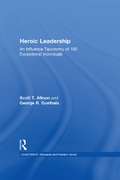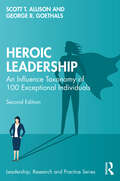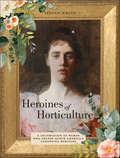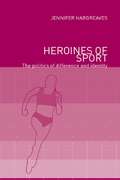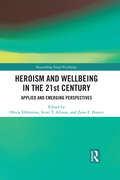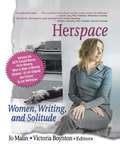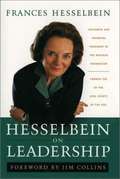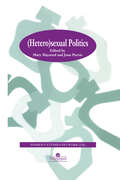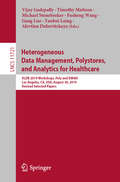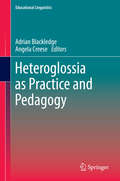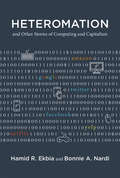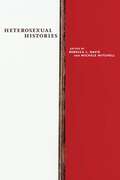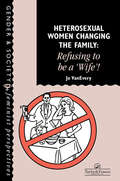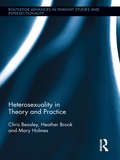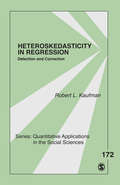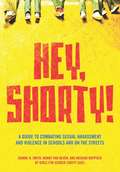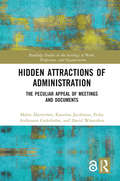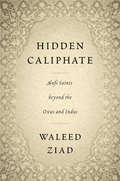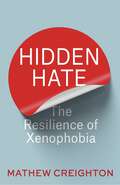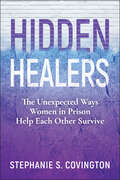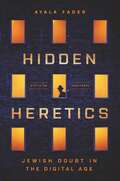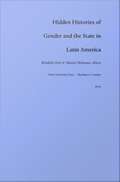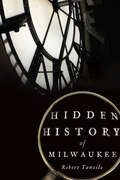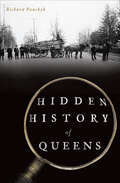- Table View
- List View
Heroic Leadership: An Influence Taxonomy of 100 Exceptional Individuals (Leadership: Research and Practice)
by George R. Goethals Scott T. AllisonHeroic Leadership is a celebration of our greatest heroes, from legends such as Mahatma Gandhi to the legions of unsung heroes who transform our world quietly behind the scenes. The authors argue that all great heroes are also great leaders. The term ‘heroic leadership’ is coined to describe how heroism and leadership are intertwined, and how our most cherished heroes are also our most transforming leaders. This book offers a new conceptual framework for understanding heroism and heroic leadership, drawing from theories of great leadership and heroic action. Ten categories of heroism are described: Trending Heroes, Transitory Heroes, Transparent Heroes, Transitional Heroes, Tragic Heroes, Transposed Heroes, Transitional Heroes, Traditional Heroes, Transforming Heroes, and Transcendent Heroes. The authors describe the lives of 100 exceptional individuals whose accomplishments place them into one of these ten hero categories. These 100 hero profiles offer supporting evidence for a new integration of theories of leadership and theories of heroism.
Heroic Leadership: An Influence Taxonomy of 100 Exceptional Individuals (Leadership: Research and Practice)
by George R. Goethals Scott T. AllisonHeroic Leadership is a celebration of our greatest heroes, from well-known legends to the legions of unsung heroes who transform our world quietly behind the scenes. Now in its second edition, this book offers a compelling conceptual framework for understanding heroism and heroic leadership, drawing from theories of great leadership and heroic action.With over 50 revised heroic leader profiles, and 30 new profiles of individuals that have transformed the world, the book explores the many counterintuitive ways that heroes lead, shape, and mobilize their followers. The authors offer a definition of heroic leadership that explains how people easily misconstrue both leadership and heroism, and provide an innovative take on why people are drawn to heroic leaders, and why this can be considered a “fatal attraction”. Incorporating the latest theory and research, the authors unpack the following ten categories of heroism: trending heroes, transitory heroes, transparent heroes, transitional heroes, tragic heroes, transposed heroes, transitional heroes, traditional heroes, transforming heroes, and transcendent heroes. From within these categories, the authors identify 100 exceptional individuals, describing their lives and how they exemplify the characteristics of the category they have been assigned.Suggesting that our most cherished heroes make for our most transforming leaders, this is a vital resource for students and scholars of leadership studies, organizational behaviour and social psychology. Presenting valuable insights into the lives of both historical and modern leaders, the book is also a fascinating read for casual readers.
Heroines of Horticulture: A Celebration of Women Who Shaped North America's Gardening Heritage
by Stefan WhiteA celebration and a salute to 100 brave, determined, creative women over the past few centuries who have shaped North America’s heritage and landscapes through their horticulture work and contributions. Through tales of invention, creativity, dogged research, innovation, perspiration, and inspiration spanning from the early 1700s to the mid-1980s, Heroines of Horticulture offers readers insight into 100 influential women who met and overcame obstacles to contribute a horticulture legacy that has helped shape the land that surrounds us today in North America. Many of the featured women are unknown or forgotten figures of horticulture history, making this book an overdue opportunity to acknowledge their work and celebrate their achievements that have left a lasting legacy. Profiles include the following: Martha Danielle Logan (1704–1779): An early American botanist who was instrumental in seed exchanges between Britain and the North American colonies. She wrote an influential gardening advice column and was a major collector of plants endemic to the Carolinas. Annie Linda Jack (1839–1912): The first Canadian professional female garden writer. Upon her marriage, she had stipulated for 1 acre of land to be devoted to any department of horticulture she chose, the profits to be her own pocket money. She wrote about her experiences in the Rural New Yorker, under the title "A Woman's Acre." The American horticulturalist Liberty Hyde Bailey referred to Annie Linda Jack's garden as "one of the most original gardens I know." Mary Gibson Henry (1884–1967): An American botanist and plant collector from Lower Merion Township, Pennsylvania, near Philadelphia, who also served as president of the American Horticultural Society. The daylily Hymenocallis henryae is named in her honor. Nelva Weber (1908–1990): An American landscape architect who wrote extensively about landscape design. She opened her practice in 1945 in New York City. Prior to that, she worked on the Palisades Parkway with C. C. Combs. She was also employed by the architecture firm Shaw Maess & Murphy and later as a designer on city parks for the New York City Parks Department. And many more Heroines of Horticulture is the perfect addition to the shelves and coffee tables of gardening enthusiasts and women’s history and feminist history readers and makes a great gift for anyone with a love of gardening or landscape design and history.
Heroines of Sport: The Politics of Difference and Identity
by Jennifer HargreavesHeroines of Sport looks closely at different groups of women whose stories have been excluded from previous accounts of women's sports and female heroism. It focuses on five specific groups of women from different places in the world: Black women in South Africa; Muslim women from the Middle East; Aboriginal women from Australia and Canada; and lesbian and disabled women from different countries worldwide. It also asks searching questions about colonialism and neo-colonialism in the women's international sport movement.The particular groups of women featured in the book reflect the need to look at specific categories of difference relating to class, culture, disability, ethnicity, race, religion and sexual orientation. In her account, Jennifer Hargreaves reveals how the participation of women in sport across the world is tied to their sense of difference and identity. Based on original research each chapter includes material which relates to significant political and cultural developments.Heroines of Sport will be invaluable reading for undergraduate and postgraduate students of sport sociology, and will also be relevant for students working in women's studies and other specialized fields, such as development studies or the politics of Aboriginality, disability, Islam, race and sexuality.
Heroism and Wellbeing in the 21st Century: Applied and Emerging Perspectives (Researching Social Psychology)
by Scott T. Allison Olivia Efthimiou Zeno E. FrancoOffering a holistic take on an emerging field, this edited collection examines how heroism manifests, is appropriated, and is constructed in a broad range of settings and from a variety of disciplines and perspectives. Psychologists, educators, lawyers, researchers and cultural analysts consider how heroism intersects with wellbeing, and how we still use—and even abuse—heroism as a vehicle to thrive and prosper in the everyday and in the face of the most unbearable situations. Highlighting some of the most pressing issues in today’s world—including genocide, racism, deceitful business practices, bystanderism, mental health, unethical governance and the global refugee crisis—this book applies a critical psychological perspective in synthesizing the social construction of heroism and wellbeing, contributing to the development of global wellbeing indicators and measures.
Herspace: Women, Writing, and Solitude
by J Dianne Garner Victoria Boynton Jo MalinThis collection delves deeply into the power of solitude in a richly detailed exploration of the lives of women writers! The essays in this fascinating volume combine literary theory, autobiography, performance, and criticism, while opening minds and expanding concepts of women's roles both in the home and within academia along the way. Herspace: Women, Writing, and Solitude begins with a discussion of the importance of solitude to the works of a variety of writers, including Margaret Atwood, May Sarton, Virginia Woolf, Marguerite Duras, and Zora Neale Hurston, and then moves on to an examination of the actual solitary spaces of women writers. The book concludes with the stories of modern women asserting their right to a space of their own. These essays, full of pain and new growth, lessons learned and battles fought, resound with the honesty and courage the authors have found in the process of truly making their own homes. Herspace examines: the stereotyped spinster solitude as a process and a journey women's prison literature cars, empty nests, kitchen counters, and other found spaces for writing the meaning of a home of one's own creating beauty in solitary settings Contributors to Herspace have made a conscious effort to integrate the personal with the academic, and the result is a volume of surprising intimacy, a window into the world of women writers past and present actively engaging solitude. From finding and defining the muse to the identity issues of home ownership, Herspace, which includes Jan Wellington's essay "What to Make of Missing Children (A Life Slipping into Fiction)," (winner of the 2003 NCTE Donald Murray Prize for "the best creative essay about teaching and/or writing published during the preceding year") provides you with the perspectives of women who are living these issues. As the editors write: "The solitary space itself enables the writing process, protects it. And women, more than men, need this enabling protection. Women need to claim their own space, to bargain and plan and keep out of sight that solitary space in which to commune with their thoughts and feelings, to experience their creative process intimately." Herspace explores these women's experiences, revealing the unique creativity that comes from solitude.
Hesselbein on Leadership
by Jim Collins Frances HesselbeinFrances Hesselbein rose from a volunteer troop leader to become CEO of the Girl Scouts of the U. S. A. During her tenure, Hesselbein transformed the Girl Scouts and created one of the most vibrant and recognized organizations in the world. This book affirms Hesselbein's specific leadership principles that will give readers the inspiration to go forth and become exemplary leaders. It is also filled with the practical knowledge readers need so they can make a difference every day. Hesselbein on Leadership will engage, energize and motivate readers to do their best and be their best.
HeteroSexual Politics
by June Purvis Mary MaynardSexuality and sexual politics have been much debated over the last 20 years and feminists, in particular, have been responsible for politicising the debate, pointing out how something which is usually regarded as private and personal is, in fact, a public and political issue. This text illustrates the diversity and excitement of debates about sexuality in women's studies and feminism today, and points to new paths for feminist analysis, thinking and action. In particular, heterosexuality can no longer be taken for granted and must, along with other forms of sexuality, be explicitly addressed. The volume is divided into three sections: "Analysing (Hetero)sexuality" is concerned with exploring some of the complexities of the material aspects of sexual relations between men and women; "Media Discourses of Sexuality" contains analyses derived from women's magazines, television and newspapers; and "Practising Sexual Politics" focuses on the reflexive awareness of sexual politics in the framing of methodological issues in research.
Heterogeneous Data Management, Polystores, and Analytics for Healthcare: VLDB 2019 Workshops, Poly and DMAH, Los Angeles, CA, USA, August 30, 2019, Revised Selected Papers (Lecture Notes in Computer Science #11721)
by Michael Stonebraker Fusheng Wang Gang Luo Vijay Gadepally Timothy Mattson Yanhui Laing Alevtina DubovitskayaThis book constitutes the refereed post-conference proceedings for the VLBD conference workshops entitled: Towards Polystores That Manage Multiple Databases, Privacy, Security and/or Policy Issues for Heterogenous Data (Poly 2019) and the Fifth International Workshop on Data Management and Analytics for Medicine and Healthcare (DMAH 2019), held in Los Angeles, CA, USA, in August 2019, in conjunction with the 45th International Conference on Very Large Data Bases, VLDB 2019. The 20 regular papers presented together with 2 keynote papers were carefully reviewed and selected from 31 initial submissions. The papers are organized in topical sections named:Poly 2019: Privacy, Security and/or Policy Issues for Heterogenous Data; Building Polystore Systems.DMAH 2019: Database Enabled Biomedical Research; AI for Healthcare; Knowledge Discovery from Unstructured Biomedical Data; Blockchain and Privacy Preserving Data Management.
Heterogenität und Diversität in Städten mittlerer Größe: Das Beispiel Landau in der Pfalz
by Sebastian Fitz-KlausnerGesellschaftliche Vielfalt wird in der Regel mit Metropolen assoziiert und in der Wissenschaft primär als Phänomen großstädtischen Lebens reflektiert. Anhand ausgewählter Fallbeispiele aus Landau in der Pfalz zeigt der Sammelband jedoch auf, dass Heterogenität und Diversität auch in Mittelstädten gesellschaftliche Normalität war und ist. Auf der Basis empirischer Befunde formuliert der Band zudem theoretische Überlegungen zu Heterogenität und Diversität in Städten mittlerer Größe, wodurch er einen Beitrag zur Überwindung eines wichtigen Forschungsdesiderats – der wissenschaftlichen Reflexion gesellschaftlicher Vielfalt jenseits großstädtischer Metropolen – leistet.
Heteroglossia as Practice and Pedagogy
by Angela Creese Adrian BlackledgeThis volume presents evidence about how we understand communication in changing times, and proposes that such understandings may contribute to the development of pedagogy for teaching and learning. It expands current debates on multilingualism, asking which signs are in use and in action, and what are their social, political, and historical implications. The volume's starting-point is Bakhtin's 'heteroglossia', a key concept in understanding the tensions, conflicts, and multiple voices within, among, and between those signs. The chapters provide illuminating accounts of language practices as they bring into play, both in practice and in pedagogy, voices which index students' localities, social histories, circumstances, and identities. The book documents the performance of linguistic repertoires in an era of profound social change caused by the shifting nature of nation-states, increased movement of people across territories, and growing digital communication. "Our thinking on language and multilingualism is expanding rapidly. Up until recently we have tended to regard languages as bounded entities, and multilingualism has been understood as knowing more than one language. Working with the concept of heteroglossia, researchers are developing alternative perspectives that treat languages as sets of resources for expressing meaning that can be drawn on by speakers in communicatively productive ways in different contexts. These perspectives raise fundamental questions about the myriad of ways of knowing and using language(s). This collection brings together the contributions of many of the key researchers in the field. It will provide an authoritative reference point for contemporary interpretations of 'heteroglossia' and valuable accounts of how 'translanguaging' can be explored and exploited in the fields of education and cultural studies. " Professor Constant Leung, King's College London, UK. "From rap and hip hop to taxi cabs, and from classrooms to interactive online learning environments, each of the chapters in this volume written by well-known and up-and-coming scholars provide fascinating accounts drawing on a wide diversity of rich descriptive data collected in heteroglossic contexts around the globe. Creese and Blackledge have brought together a compelling collection that builds upon and expands Bakhtin's construct of heteroglossia. These scholars help to move the field away from the view of languages as separate bounded system by providing detailed examples and expert analyses of the ways bilinguals and multilinguals draw upon their linguistic repertoires for effective and meaningful communication. " Wayne E. Wright, University of Texas at San Antonio, USA.
Heteromation, and Other Stories of Computing and Capitalism (Acting with Technology)
by Bonnie A. Nardi Hamid R. EkbiaAn exploration of a new division of labor between machines and humans, in which people provide value to the economy with little or no compensation.The computerization of the economy—and everyday life—has transformed the division of labor between humans and machines, shifting many people into work that is hidden, poorly compensated, or accepted as part of being a “user” of digital technology. Through our clicks and swipes, logins and profiles, emails and posts, we are, more or less willingly, participating in digital activities that yield economic value to others but little or no return to us. Hamid Ekbia and Bonnie Nardi call this kind of participation—the extraction of economic value from low-cost or free labor in computer-mediated networks—“heteromation.” In this book, they explore the social and technological processes through which economic value is extracted from digitally mediated work, the nature of the value created, and what prompts people to participate in the process.Arguing that heteromation is a new logic of capital accumulation, Ekbia and Nardi consider different kinds of heteromated labor: communicative labor, seen in user-generated content on social media; cognitive labor, including microwork and self-service; creative labor, from gaming environments to literary productions; emotional labor, often hidden within paid jobs; and organizing labor, made up of collaborative groups such as citizen scientists. Ekbia and Nardi then offer a utopian vision: heteromation refigured to bring end users more fully into the prosperity of capitalism.
Heterosexual Histories (Sexual Cultures)
by Michele Mitchell Rebecca L DavisThe history of heterosexuality in North America across four centuriesHeterosexuality is usually regarded as something inherently “natural”—but what is heterosexuality, and how has it taken shape across the centuries? By challenging ahistorical approaches to the heterosexual subject, Heterosexual Histories constructs a new framework for the history of heterosexuality, examining unexplored assumptions and insisting that not only sex but race, class, gender, age, and geography matter to its past. Each of the fourteen essays in this volume examines the history of heterosexuality from a different angle, seeking to study this topic in a way that recognizes plurality, divergence, and inequity.Editors Rebecca L. Davis and Michele Mitchell have formed a collection that spans four centuries, addressing the many different racial groups, geographies, and subcultures of heterosexuality in North America. The essays range across disciplines with experts from various fields examining heterosexuality from unique perspectives: a historian shows how defining heterosexuality, sex, and desire were integral to the formation of British America and the process of colonization; a legal scholar examines the connections between race, sexual citizenship, and nonmarital motherhood; a gender studies expert analyzes the Clinton-Lewinsky scandal, and explores the Intersectionsof heterosexuality with shame and second-wave feminism. Together, these essays explain how differently earlier Americans understood the varieties of gender and different-sex sexuality, how heterosexuality emerged as a dominant way of describing gender, and how openly many people acknowledged and addressed heterosexuality’s fragility.By contesting presumptions of heterosexuality’s stability or consistency, Heterosexual Histories opens the historical record to interrogations of the raced, classed, and gendered varieties of heterosexuality and considers the implications of heterosexuality’s multiplicities and changes. Providing both a sweeping historical survey and concentrated case studies, Heterosexual Histories is a crucial addition to the field of sexuality studies.
Heterosexual Women Changing The Family: Refusing To Be A "Wife"! (Gender And Society Ser.)
by Jo Van EveryFirst Published in 1995. Routledge is an imprint of Taylor & Francis, an informa company.
Heterosexuality in Theory and Practice (Routledge Advances in Feminist Studies and Intersectionality)
by Chris Beasley Mary Holmes Heather BrookThis book explores heterosexualities in their complex and everyday expressions. It engages with theories about the intersection of sexuality with other markers of difference, and gender in particular. The outcome will productively upset equations of heterosexuality with heteronormativity and accounts that cast heterosexuality in "sex critical, sex as danger" terms. Queer/feminist ‘pro-sex’ perspectives have become prevalent in analyses of sexuality, but in these approaches queer becomes the site of subversive, transgressive, exciting and pleasurable sex, while heterosex, if mentioned at all, continues to be seen as objectionable or dowdy. It challenges heterosexuality’s comparative absence in gender/sexuality debates and the common constitution of heterosexuality as nasty, boring and normative. The authors develop an innovative analysis showing the limits of the sharply bifurcated perspectives of the "sex wars". This is not a revisionist account of heterosexuality as merely one option in a fluid smorgasbord, nor does it dismiss the weight of feminist/pro-feminist critiques of heterosexuality. This book establishes that if relations of domination do not constitute the analytical sum of heterosexuality, then identifying its range of potentialities is clearly important for understanding and helping to undo its "nastier" elements.
Heteroskedasticity in Regression: Detection and Correction
by Robert L. KaufmanHeteroskedasticity in Regression: Detection and Correction, by Robert Kaufman, covers the commonly ignored topic of heteroskedasticity (unequal error variances) in regression analyses and provides a practical guide for how to proceed in terms of testing and correction. Emphasizing how to apply diagnostic tests and corrections for heteroskedasticity in actual data analyses, the monograph offers three approaches for dealing with heteroskedasticity: (1) variance-stabilizing transformations of the dependent variable; (2) calculating robust standard errors, or heteroskedasticity-consistent standard errors; and (3) generalized least squares estimation coefficients and standard errors. The detection and correction of heteroskedasticity is illustrated with three examples that vary in terms of sample size and the types of units analyzed (individuals, households, U.S. states). Intended as a supplementary text for graduate-level courses and a primer for quantitative researchers, the book fills the gap between the limited coverage of heteroskedasticity provided in applied regression textbooks and the more theoretical statistical treatment in advanced econometrics textbooks.
Hey, Shorty!
by Joanne Smith Girls for Gender Equity Mandy Van Deven Meghan HuppuchAt every stage of education, sexual harassment is common, and often considered a rite of passage for young people. It's not unusual for a girl to hear "Hey, Shorty!" on a daily basis as she walks down the hall or comes into the school yard, followed by a sexual innuendo, insult, come-on, or assault. But when teenagers are asked whether they experience this in their own lives, most of them say it's not happening.Girls for Gender Equity, a nonprofit organization based in New York City, has developed a model for teens to teach one another about sexual harassment. How do you define it? How does it affect your self-esteem? What do you do in response? Why is it so normalized in schools, and how can we as a society begin to address these causes? Geared toward students, parents, teachers, policy makers, and activists, this book is an excellent model for building awareness and creating change in any community.Founded by Joanne Smith, Girls for Gender Equity is a nonprofit organization based in Brooklyn committed to the physical, psychological, social, and economic development of urban girls.
Hidden Attractions of Administration: The Peculiar Appeal of Meetings and Documents (Routledge Studies in the Sociology of Work, Professions and Organisations)
by Malin Åkerström Katarina Jacobsson Erika Andersson Cederholm David WästerforsThis book argues that the expansion of administrative activities in today’s working life is driven not only by pressure from above, but also from below. The authors examine the inner dynamics of people-processing organizations—those formally working for clients, patients, or students—to uncover the hidden attractions of doing administrative work, despite all the complaints and laments about "too many meetings" or "too much paperwork." There is something appealing to those compelled to participate in today’s constantly multiplying and expanding administration that defies popular framings of it as merely pressure from above. Hidden Attractions of Administration shows in detail the emotional attractiveness, moral conflicts, and almost magical features that administrative tasks often entail in today’s organizations, supported by ethnographic studies consisting of over 200 qualitative interviews and participant observations from ten organizational settings and contexts across Sweden. The authors also question and complement explanations in administration-related research that have previously been taken for granted, arguing that it is a simplification to attribute all aspects of the change to New Public Management and instead taking into account what the classic sociologist Georg Simmel called an Eigendynamik: a self-reinforcing tendency that, under certain circumstances, needs only a nudge in an administrative direction to get going. By applying ethnography to issues of bureaucratization and meeting cultures and by drawing on findings in emotional sociology and social anthropology, this volume contributes to both the sociology of work and the study of human service organizations and will appeal to scholars and students working across both areas.
Hidden Caliphate: Sufi Saints beyond the Oxus and Indus
by Waleed ZiadSufis created the most extensive Muslim revivalist network in Asia before the twentieth century, generating a vibrant Persianate literary, intellectual, and spiritual culture while tying together a politically fractured world. In a pathbreaking work combining social history, religious studies, and anthropology, Waleed Ziad examines the development across Asia of Muslim revivalist networks from the eighteenth to the twentieth centuries. At the center of the story are the Naqshbandi-Mujaddidi Sufis, who inspired major reformist movements and articulated effective social responses to the fracturing of Muslim political power amid European colonialism. In a time of political upheaval, the Mujaddidis fused Persian, Arabic, Turkic, and Indic literary traditions, mystical virtuosity, popular religious practices, and urban scholasticism in a unified yet flexible expression of Islam. The Mujaddidi “Hidden Caliphate,” as it was known, brought cohesion to diverse Muslim communities from Delhi through Peshawar to the steppes of Central Asia. And the legacy of Mujaddidi Sufis continues to shape the Muslim world, as their institutional structures, pedagogies, and critiques have worked their way into leading social movements from Turkey to Indonesia, and among the Muslims of China. By shifting attention away from court politics, colonial actors, and the standard narrative of the “Great Game,” Ziad offers a new vision of Islamic sovereignty. At the same time, he demonstrates the pivotal place of the Afghan Empire in sustaining this vast inter-Asian web of scholastic and economic exchange. Based on extensive fieldwork across Afghanistan, Uzbekistan, and Pakistan at madrasas, Sufi monasteries, private libraries, and archives, Hidden Caliphate reveals the long-term influence of Mujaddidi reform and revival in the eastern Muslim world, bringing together seemingly disparate social, political, and intellectual currents from the Indian Ocean to Siberia.
Hidden Hate: The Resilience of Xenophobia
by Mathew CreightonOpposition to immigration has fueled a spate of populist movements in the United States and Europe. The potency of xenophobic politics is often explained in terms of factors such as economic insecurity, material competition, group identity, cultural conflicts, and social changes. These explanations have proven to be inadequate, particularly in often affluent and pluralistic contexts with relatively low levels of unemployment and poverty. How can these seemingly tolerant societies harbor intense antipathy toward migrants?Mathew Creighton develops a new model for understanding xenophobia by shining a light on the layers of intolerance concealed beneath the surface. Drawing on rich empirical evidence from innovative survey experiments conducted in the United States, the United Kingdom, Ireland, Norway, and the Netherlands, he argues that prejudice is often present but intentionally and strategically hidden. What can change, however, are the norms that govern the social acceptability of xenophobia. When the public expression of previously impermissible beliefs is pursued by politicians and society more broadly, the stigma of open intolerance lifts to reveal the true face of this once-masked xenophobia. Creighton challenges the assumption that overt anti-immigrant sentiment is mostly attributable to economic or social crises, showing that this narrative overlooks a substantial and largely stable reservoir of intolerance.Deeply researched, comparative, and generative, Hidden Hate provides timely and vital insight into the persistence of xenophobia.
Hidden Healers: The Unexpected Ways Women in Prison Help Each Other Survive
by Stephanie S. CovingtonA gripping and deeply-felt examination of incarcerated women's lives With unflinching clarity, Hidden Healers cuts through the myths about incarcerated women to expose the all-too-real brutalities they face within a criminal legal system never designed for them. Backed by three decades' experience providing therapeutic programs inside prisons across the United States, trauma specialist Dr. Stephanie Covington has used her unique access to amplify the voices of the women themselves. Their stories illuminate realities most never see: that most women who get caught up in the criminal justice system have themselves been victims of harm, that the degradations of today's prisons and jails only magnify their trauma- and that incarcerated women regularly risk punishment to tend to one another's well-being in unexpected acts of kindness. Grounded in research and rich with personal narrative, Hidden Healers is a poignant and riveting look inside women's prisons and jails- and what we can do to help.
Hidden Heretics: Jewish Doubt in the Digital Age (Princeton Studies in Culture and Technology #27)
by Ayala FaderA revealing look at Jewish men and women who secretly explore the outside world, in person and online, while remaining in their ultra-Orthodox religious communities What would you do if you questioned your religious faith, but revealing that would cause you to lose your family and the only way of life you had ever known? Hidden Heretics tells the fascinating, often heart-wrenching stories of married ultra-Orthodox Jewish men and women in twenty-first-century New York who lead “double lives” in order to protect those they love. While they no longer believe that God gave the Torah to Jews at Mount Sinai, these hidden heretics continue to live in their families and religious communities, even as they surreptitiously break Jewish commandments and explore forbidden secular worlds in person and online. Drawing on five years of fieldwork with those living double lives and the rabbis, life coaches, and religious therapists who minister to, advise, and sometimes excommunicate them, Ayala Fader investigates religious doubt and social change in the digital age.The internet, which some ultra-Orthodox rabbis call more threatening than the Holocaust, offers new possibilities for the age-old problem of religious uncertainty. Fader shows how digital media has become a lightning rod for contemporary struggles over authority and truth. She reveals the stresses and strains that hidden heretics experience, including the difficulties their choices pose for their wives, husbands, children, and, sometimes, lovers. In following those living double lives, who range from the religiously observant but open-minded on one end to atheists on the other, Fader delves into universal quandaries of faith and skepticism, the ways digital media can change us, and family frictions that arise when a person radically transforms who they are and what they believe.In stories of conflicts between faith and self-fulfillment, Hidden Heretics explores the moral compromises and divided loyalties of individuals facing life-altering crossroads.
Hidden Histories of Gender and the State in Latin America
by Elizabeth Dore Maxine MolyneuxThis collection examines the mutually influential interactions of gender and the state in Latin America from the late colonial period to the end of the twentieth century. Locating watershed moments in the processes of gender construction by the organized power of the ruling classes and in the processes by which gender has conditioned state-making, Hidden Histories of Gender and the State in Latin America remedies the lack of such considerations in previous studies of state formation. Along these lines, the book begins with two theoretical chapters by the editors, Elizabeth Dore and Maxine Molyneux. Dore opens by arguing against the prevailing view that the nineteenth century was marked by a gradual emancipation of women, while Molyneux considers how various Latin American state forms--liberal, corporatist, socialist, neoliberal--have more recently sought to incorporate women into their projects of social reform and modernization. These essays are followed by twelve case studies that examine how states have contributed to the normalization of male and female roles and relations. Covering an impressive breadth not only of historical time but also of geographical scope, this volume moves from Brazil to Costa Rica, from Mexico to Chile, traversing many countries in between. Contributors explore such topics as civic ritual in Bolivia, rape in war-torn Colombia, and the legal construction of patriarchy in Argentina. They examine the public regulation of domestic life, feminist lobby groups, class compromise, female slaves, and women in rural households--distinct, salient aspects of the state-gender relationship in specific countries at specific historical junctures. By providing a richly descriptive and theoretically grounded account of the interaction between state and gender politics in Latin America, this volume contributes to an important conversation between feminists interested in the state and political scientists interested in gender. It will be valuable to such disciplines as history, sociology, international comparative studies, and Latin American studies. Contributors. Mara Eugenia Chaves, Elizabeth Dore, Rebecca Earle, Jo Fisher, Laura Gotkowitz, Donna J. Guy, Fiona Macaulay, Maxine Molyneux, Eugenia Rodriguez, Karin Alejandra Rosemblatt, Ann Varley, Mary Kay Vaughan
Hidden History of Milwaukee (Hidden History)
by Robert TanziloJoin a local history expert for an exclusive behind-the-scenes tour of Milwaukee&’s incredible past. Sail out to the Breakwater Lighthouse, scramble up the wings of the Milwaukee Art Museum, and dig up the city&’s roots on the corner of Water Street and Wisconsin Avenue. Seize the chance to do a little urban spelunking and explore basilicas, burial grounds, and breweries. Ring the bell in the city hall tower, and take a turn around the secret indoor track at a Montessori school. No space is off limits in these untold stories of the Cream City's most familiar places and celebrated landmarks, from Bobby Tanzilo of the popular OnMilwaukee website. Includes photos!
Hidden History of Queens (Hidden History)
by Richard PanchykTrue stories and vintage photos of this bustling New York City borough, covering everything from crime and corruption to a beloved Christmas poem. Queens has a history filled with fascinating firsts, cool characters and ramshackle ruins. From the nation&’s first modern highway to the first-ever transatlantic flight, the borough has long been at the forefront of modern transportation. Poet Clement Clarke Moore was inspired by childhood memories of Elmhurst when he wrote the poem &“&’Twas the Night before Christmas.&” The infamous William &“Boss&” Tweed once fled jail to a secret hideout in a Bayside hotel. The remains of the old Creedmoor Hospital complex in Queens Village are haunting, as are the eerie remnants of Fort Tilden in the Rockaways. In this fascinating book, Richard Panchyk reveals glimpses of the hidden history of Queens.
